 loading
loading
featuresFirst-person stories: Yale men"The quarterback of the Yale football team, Matt Jordan, knew how to diaper a baby. It helps when you are the oldest of six children." 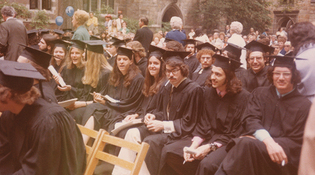 Courtesy Andrea DaRifWomen graduates in the Saybrook Class of ’73 at commencement, from left: Lawrie Mifflin, Andrea DaRif, Keri Keating, Rachel Hockett, and Margy Weiner. The men at right are unidentified. View full imageThese stories were written by women responding to our request for memories of their experiences as the first female undergrads at Yale. See other stories on these topics: In the Colleges, Gratitude, Yale Administration, May Day, and In the Classroom. You’ll see that some writers’ names are asterisked. These women submitted their stories also to the Written History Project, founded by the 50th Anniversary Committee so that all alumnae of the time can contribute to the history of coeducation at Yale College. (There’s also an Oral History Project and an Archives Project.) And finally: we invite all readers to send their letters and reactions—including stories of their own experiences of breaking boundaries at Yale—to editor@yalealumnimagazine.com. _________________________________ Julia Preston ’73 (graduated ’76) During our first year, Vanderbilt operated under a curfew. No man was supposed to be in the building after the designated hour, which I recall was 10 p.m. Some men figured out that if they couldn’t get into Vanderbilt after the curfew, they also couldn’t leave. Women often found they had men in their rooms who were looking for a place to sleep the night—whether they’d been invited or not. At times I had difficulty studying in peace. Men friends would spot me in a reading room and want to chat. It took a while for some upperclassmen to adjust to the idea that we were there to learn, not to socialize. To read without interruption, I had to hide in the most solitary Sterling stacks. But mostly those culture clashes were irritating or plain silly.
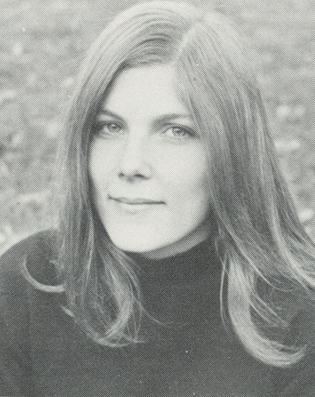 View full imageAndrea DaRif ’73 Among the countless Yale stories, one from the night before graduation really resonates with me. There were maybe ten of us—a closeknit group of both men and women friends in Saybrook—having dinner at Mory’s to celebrate us “girls” about to become the first four-year women graduates of Yale College. The libations were flowing, as our Master, our Dean, and various administrators kept sending cups to our table. Sometime much later—the party had floated back to Saybrook and included gin waffles (don’t ask) at 3:00 a.m.—the three of us who were freshman counselors on Old Campus decided we really needed to go back and get some sleep. So off we stumbled to High Street, where we suddenly realized that the side gates were locked and we had to walk all the way around to Phelps Gate. Well, my pals, both men, decided they were going up and over the fence instead. I watched them for a moment, thinking, “Hey, I’ve been one of the guys for four years. No way I’m going wimp out!” So up I went—no easy feat when you’re wearing high heels and a miniskirt! Well, they were now lying spread-eagled in the quadrangle grass and began a funny running commentary on my climbing technique, which got us all laughing so hard I nearly impaled myself on the top spikes. But somehow I managed to drop down without incurring bodily injury. After many cheers and hugs, we then headed off to our rooms. Even though my wits were pretty fuzzed, I vividly remember thinking at that moment how incredibly lucky I was to have made such wonderful friends at Yale.
Name withheld This is a story that needs to be told. I can’t talk about others’ experiences with sexuality, but of course there were one-night stands (what would now be called hookups). For those of us from protected backgrounds, the Pill was not available, so we relied on male partners to use condoms. In winter 1970, Philip Sarrel (the first gynecologist hired by the Yale health service) and his wife offered a course on human sexuality, probably the first meaningful sex-ed class I had ever had. We found out we could get prescriptions for the pill at DUH, and I considered it but didn’t have a serious boyfriend. A few weeks later, I realized I needed different assistance. An encounter had gotten pretty “hot and heavy” very fast, and we had not used protection. I went to DUH and got a morning-after pill—still experimental, but available to Yale students. It left me dry-heaving for 24 hours, but I remember expressly thinking, with the typical carelessness of youth: “I don’t care if I’m increasing the risk of some kind of cancer in the future with all that estrogen. I just can’t deal with getting pregnant now.”
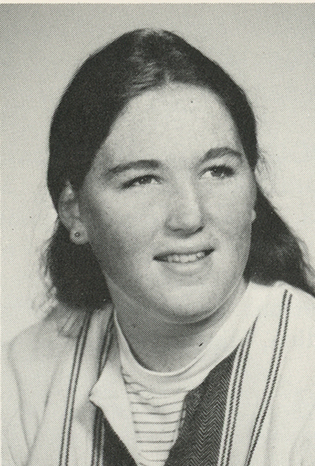 View full imageSarah Birdsall ’72 * In general, the seniors were pretty horrible that first year. We girls had, after all, ruined their perfect fraternal experience with our daily presence. To them, girls existed for weekend fun. I don’t remember many junior boys. But the saving grace for me were the funny, sweet fellow sophomore boys who were friends and brothers and welcomed us with natural grace. I had had no male friends prior to Yale. My brothers lived in a separate world of high expectations while I, the youngest and female, floated seamlessly under the parental radar. Boys in my family went away to rigorous male academic boarding school. Girls stayed home and went to the local female ‘academy’ before going off to an all-female college. Boys and academics were absent from my life before Yale. Those sophomore boys introduced me to an entirely new concept of a friend and neighbor and buddy who also happened to be male. They made that first year bearable for a poorly prepared academically and socially awkward girl. Those friendships saved me. . . . I would not call my Yale years the happiest of my life. But, in the end, looking back over a long professional career in which I got to control my destiny, I know it was Yale that made that happen. So, yeah, it was worth it. And it does make me proud to have been a very tiny bit in the history of the women’s movement.
Debra Herman ’72 * He was a junior. I was a sophomore. We met in a yearlong mathematics class. Most weeks I attended a study group held in the living room of his suite in his residential college. His father, a mathematician, gave us tips over the phone. At the course’s end, I received a grade of Honors. He received a grade of High Pass. We knew each other’s grades because we happened to show up moments apart to check a coded list of scores outside the Math Department. He wanted to know my grade and I told him. He let me know his grade and expressed anger that I had bested him, as he considered himself the superior mathematical talent. The final had been a quirky multiple-choice test. I thought myself lucky and the outcome a fluke. I believed he would soon get past any resentment. A day or so later, I went to his suite to say goodbye for the summer. We were briefly alone while we waited for a group to assemble for a lunch outing. It was in those few minutes that he sexually assaulted me. I resisted at first but he overpowered me. In the end, I submitted. When it was all over, I told no one. #MeToo
Lee Fleming ’73 I have so many memories of the weirdness of that first year (I was in the first freshmen class of women—the 250 females added to the “1,000 leaders” who clearly were men). They include being asked the woman's point of view on Beowulf in a sagas seminar; eating a silent dinner with a not-yet-famous James Taylor and my boyfriend in a dim Pierson dining hall—just us three—as he waited to perform in the Common Room; having someone walk off with my painstakingly embroidered denim jacket, hanging in a closet at the Lizzie while I was inhaling tea and sandwiches (theft at Yale? Who knew!); scaling the Old Campus fence after curfew on freezing cold nights when the skin of gloveless hands almost stuck to the metal. Especially traumatic was running the gauntlet of male students who’d gather by the same Old Campus gate at dinnertime as we filed through like cattle on our way to residential college dining halls. Some days they were worse than any construction crew, and I’d skip meals altogether just to avoid them. Bottom line: Yale wasn’t ready for us.
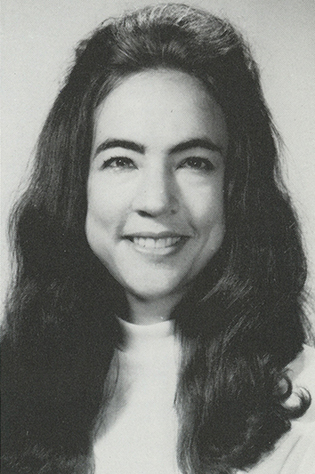 View full imageSusan Yecies '71 * Yale was one of the most forward-thinking places that I experienced, and I regret that I only spent two years there. It was a place where some of the world's best professors taught, and I was lucky to have Professors George Kubler in art history and Michael Coe in anthropology. It was a place where students got involved in things one never heard of and in things that were a sign of the times—from the Russian Chorus to the Bobby Seale trial and the Vietnam War. It was a place where there were laughs and tears, often at the same time. It was a place that offered me opportunities to explore and learn beyond academics, from tough interviews to grants to Mexico and West Africa. It is where I made some of the most lasting friendships that continue to this day. This was and still is Yale. One of the most memorable things that I learned at Yale was how to diaper a baby. I babysat for three children of a Yale College dean. He and his wife, who were going out for the evening during my first babysitting jaunt, said to me upon their departure, "Please put a diaper on the youngest child before he goes to bed." Problem: I did not know how to diaper a baby! I was the youngest in my family! I called two Ezra Stiles friends who both said that they had no idea, even though they were the oldest in their families. They told me, "Don't worry. We will find out in less than five minutes." In about 15 minutes, they called back. The quarterback of the Yale football team, Matt Jordan, knew how to diaper a baby. It helps when you are the oldest of six children. He walked me through the process, not once but a couple of times, and after several frustrating and plenty of nerve-wracking tries, guided by a calming voice over the telephone, I hit luck. Voilà, a diapered baby was before me. What smiles, chuckles and memories! A footnote: and now they have disposables. So self-evident!
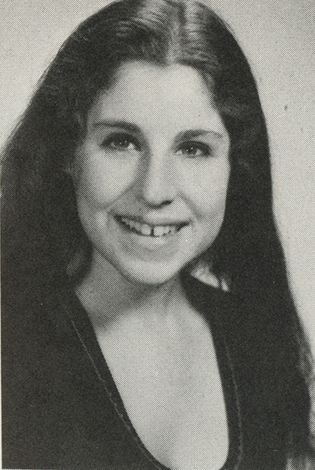 View full imageLeah Greenwald ’72 For the last eight or so years, a group of ’72 women, almost all from the NY metro area, have been meeting for lunch twice a year. We have, as a result, an email circulation list of about 40. When Keep the Damned Women Out [by Nancy Weiss Malkiel] was published, a review was circulated, and it sparked a round of emails. I learned, in that email conversation, that many women in our class had felt terrible about comments from undergraduate men—most of them in ’70—who were entirely comfortable voicing their belief that admitting women had ruined Yale. I was astounded that such comments, which I thought neatly served to reveal their speakers as idiotic sexist churls whom I need never bother with, had wounded others. Thus, it was only a couple of years ago that I learned that dismissive contempt was not the only response these guys evoked. I was 17 when I arrived at Yale as a sophomore (back then, the NYC public schools thought skipping several grades was fine), and, I now know, not as sensitive to others as I wish I had been. If I’d known then that these comments had been hurtful to other women, I would at least have tried to offer them my perspective. That email conversation also included a couple of horror stories about male professors’ comments, and those flabbergasted me too. I never heard such comments; I was only once asked for “the woman’s viewpoint” by a professor; he was a well-known and very good film critic teaching a seminar (he later married a well-known and very good feminist film critic), and his question didn’t bother me. But other women in our class heard requests for the woman’s viewpoint lots of times, and occasionally much worse.
Francine K. Welty ’71 * When I asked my bursary supervisor for a recommendation for medical school, he asked if he should write about my long blonde hair or beautiful legs—comments that would not be allowed now.
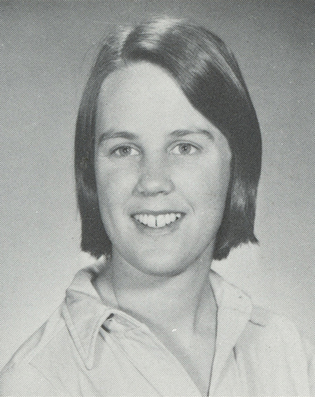 View full imageLouisa Smith Mygatt '73 * I went to a football game with one upperclass guy. He pointed out Harkness Tower to me, as if I didn't pass it every day going to the Branford Dining Hall, then tried to pay for my meal and was totally flummoxed when I pulled out my dining hall card. I remember a Saturday night mixer in the fall of 1970—a holdover from the pre-coeducation years—where women from women's colleges came by busloads to campus for a dance. I was standing in the Branford Common Room as the women arrived and filed in past all these guys checking them out. I was thrilled to be distracted from this uncomfortable scene when I spotted one of my 48 high school classmates (from an all-girls school in Ohio) entering with the Smith college group. Around 10:00 that night, back in my room, I opened the window onto High Street only to close it again as the fumes from one of the buses poured into the room. The lights were on in the bus, and I could see women in there who had given up on the mixer and were reading or sleeping as they waited for the midnight departure hour. I felt sorry for those women and so relieved that I hadn't ended up at Smith. For the 25th anniversary of coeducation, the Yale Daily News did a survey of the women in our class. I remember the interviewer asking me if I had anything to add after he finished his questions. "Yes," I said, "one of the things that bugged me the most was the administration's official line for the alumni that they would continue to enroll '1,000 male leaders' in each class.'" "You wouldn't believe how many of your classmates have mentioned that," said he. In the late ’60s, high schools were just beginning to think that educating kids about sex and relationships was a reasonable rather than dangerous thing to do and, in fact, part of their job. I think we had the first "sex-ed" classes at my high school in the 1967–68 school year, and I doubt that many of the Yale men in upper classes had experienced such classes. Fortunately, Elga Wasserman, the fabulous chem professor whom Yale president Kingman Brewster had designated to oversee the start of coeducation, hired a husband-wife pair of physicians who organized a sex-ed class open to all Yale students that first year of coeducation. As I recall, it was the biggest class ever at Yale; it had to be held in Battell Chapel, though we did break out into smaller groups for discussions. Many years later I heard Elga Wasserman speak about some of the challenges of getting ready for coeducation and learned that she had run into serious resistance to her determination to offer gynecological services at DUH (student health services). She was finally able to hire this couple—via the mental health department! She was an amazing woman to whom I was forever grateful for her vision, perseverance, and hard work in quite a short time frame. Despite some negative experiences, I loved my years at Yale. I thrived on my classes (I do remember one discussion section with a 21-1 ratio). I had wonderful times with the Glee Club, which I might well not have gotten into had there been more women students. I was a happy camper, thrilled to be there.
Barbara Wagner ’73 Although the early weeks were rough, by the middle of freshman year, the social life of the men and women in our class in my residential college had jelled. I had some romantic interests but most of my male classmates were my buddies—we sat and visited after meals, compared notes about classes, partied and studied together. One Friday evening, I remember sitting in the dining hall and a couple guys started talking about taking a road trip to Smith College. One of them had been invited to a house party and encouraged to bring some guys along. So they were about to mount an expedition to Northampton. They were looking for one or two more people to fill the car. Coincidentally, I grew up in western Massachusetts, not too far from Northampton, and I realized I didn’t have any plans for the weekend and would love to go home and see my parents. So I asked if I could ride along, and would call my parents to pick me up when we got to Smith. That is exactly what transpired. I have no idea how my classmates fared that weekend, and I was met with a poisonous stare when I arrived at the house party, but I used the pay phone in the front hallway, waited for my parents, and left without joining the festivities. I took a Peter Pan bus back to New Haven on Sunday. I don’t know if the guys all had to chip in for gas, but those were chivalrous days and I was not asked to contribute. Vanderbilt was chosen to house freshmen women in fall 1969 because of the central “entry,” which permitted Yale to install a guard to screen visitors after 10:00 pm. He was there every evening, all night, to enforce the “No male visitors in women’s rooms after 10 pm” rule (common practice at the time for most schools). By spring semester, however, an open hospitality suite was created. It included a small kitchenette, and we were permitted to make a cup of tea or coffee for a male visitor even “after hours” if we wished. This hospitality suite was right off that central entryway—opposite the guard’s desk. Of course, everyone knew that if you got into one of the entryways, it was easy to go down to the basement and access any other entryway, out of sight of the guard. One winter evening, I was returning from a movie with an upperclassman. He seemed to be quite interested in me, and I would have been interested in him, but he had terrible bad breath. I figured the guard would be my ally, and I’d be able to shed my date at the entrance. We walked in. I pointed out that it was after 10:00, so we’d better say goodnight. But the guard piped up: “You can take him up to the visitor suite and fix him some tea if you like.” I rolled my eyes and said, “Well, I’m pretty tired.” At that point the guard used his index and middle finger to mimic two walking legs, and again mentioned the hospitality suite—then mimicked walking downstairs, then walking horizontally, and finally walking upstairs. I tried to turn so that my date wouldn’t observe the demonstration, and instead said, “Thanks so much. Goodnight.”
Victoria Morgan Amon ’73 With only a few exceptions that I could easily deal with, I was treated with respect and an eagerness to get to know me. I met my husband at Yale while I was a junior auditing classes at the Law School; we married in a small ceremony in the Memorial Room at the base of Branford’s Harkness Tower, and had our reception at the old Faculty Club on Elm.
|
|
1 comment
-

Alexis Krasilovsky, Class of '71, 1:47am September 11 2019 |  Flag as inappropriate
Flag as inappropriate
The comment period has expired.For a fictionalization of the co-ed experience, read "Pillow Book of a Yale Co-Ed," Part One of the novel "Sex and the Cyborg Goddess" (published under the pseudonym Alexis Rafael). The late Darryle Pollack wrote of this book: "The book takes place during a pivotal time in the history of Yale College, the first year it admitted a small group of female coeds after nearly 300 years as an all-male institution. By exploring the challenges faced by the characters at this elite Ivy League campus, Alexis reflects and illuminates the social changes and upheaval going on in America as a whole. Yale alumni and wannabes will especially appreciate this novel, which recreates a remarkable time and place. For some of us the book is a reminder; for younger women it's a revelation of what was an entirely unique college experience."